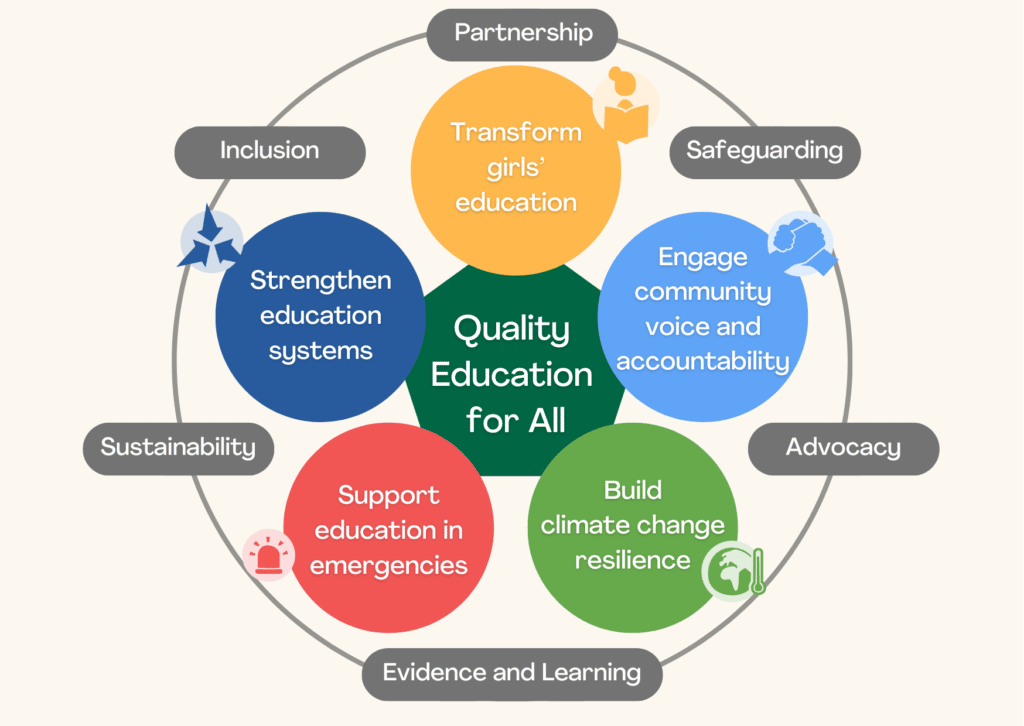Strategic goals: do they help or hinder the journey to becoming locally led?
The way INGOs develop their strategic goals can help or hinder an organisation’s journey to becoming locally led. Samantha Ross from Link Education International reflects on her organisation’s process. Back in February 2020, when the world was a different place, Link Education International invited our country directors from Ethiopia, Malawi and Uganda to Edinburgh. Our first mistake was to plan an international team meeting in Scotland in February. Yes, it snowed and it was freezing.
Despite our logistical faux pas, we still managed to join voices and thoughts to develop what we think are a pretty strong set of strategic goals to work towards. But, looking back from a place where ‘becoming locally led’ and ‘shifting the power’ are terms our sector now uses liberally, does the way we developed our goals reflect these new paradigms?
After an inspiring interview with Srabani Sen, CEO of Full Colour, for Scotland’s International Development Alliance, and guided by Bond’s Becoming locally led as an anti-racist practice – a guide to support NGOs, I reflected on our process.
Participation and decision-making
From the start we were clear that Link’s strategic goals needed to go beyond addressing the Sustainable Development Goals, and definitely beyond focusing only on SDG 4 (inclusive and equitable education). We dissected national education plans, road maps and visions as well as the African Charter 2063. Then we mapped priorities and overlaid the expertise and capacity of the Link Education family. In this way, we were able to define five programmatic areas facing gaps, which matched Link’s experience. And from that our five strategic goals were born.

This decision-making was collaborative and collective. Knowledge and understanding of specific country needs, which our country directors provided, was invaluable and core to validating our chosen goals. Given this, I would describe our goals as definitely locally led.
Ground truthing and ownership
Alongside our teamwork and deep exploration of national policies and programmes, we wanted to ‘ground truth’ or test-run our ideas, and we decided to do this by developing a consultation process. We listed stakeholders, including teachers, school leaders, community members, parents, learners, and government education staff at every level. We developed questions for face-to-face interviews and wider focus group discussions, various materials to appropriately present our draft goals, and methods to analyse and feedback the consultation’s results.
And so the consultation began. We developed slides for senior leaders to present to their Boards, and we shared our draft goals with key figures within Ministries of Education. But Covid-19 scuppered progress, and the appetite to participate in our consultation has since been overshadowed by more pressing domestic concerns.
That said, ownership of the strategic goals across the Link family is sound. But the next steps of testing whether our goals make sense to communities has been less successful. This means we can’t say our goals are community-led. However, Link does employ effective adaptive management practices, which include community-level participation, so we do involve communities in the development of our programmes.
A continuing journey
Looking back, I feel that the process of developing our goals reflects Link’s key working principles of collective leadership and decision-making, partnership, collaboration and equality of opportunity. I also hope the goals themselves not only demonstrate our areas of expertise, but also how we champion diversity, inclusion, accountability and environmental responsibility.
Using Bond’s terminology to reflect on how we developed our strategic goals, I’d describe Link Education as ‘moving along’ the scale of becoming locally led. We are not complacent; there is more to do, and we will continue to challenge ourselves on this journey.
Join the Small NGO’s working group!
This is a space to develop links within the small NGO network, to share ideas, resources and good practice, and to provide peer support.
Small NGO working groupCategory
News & Views
